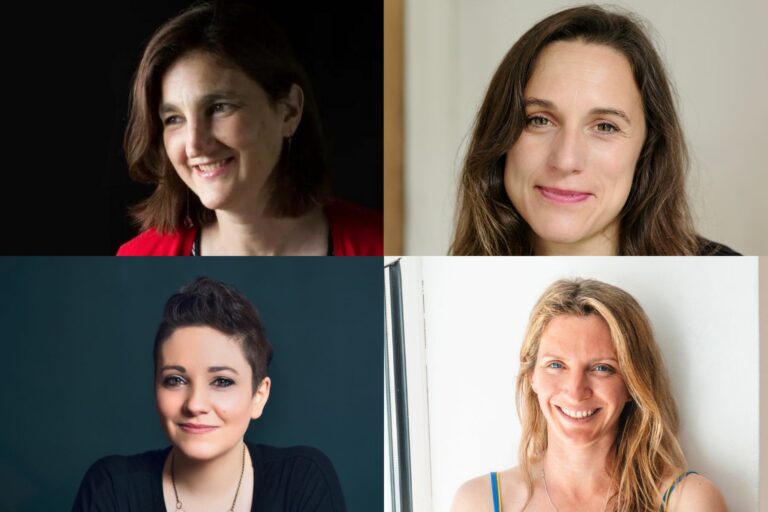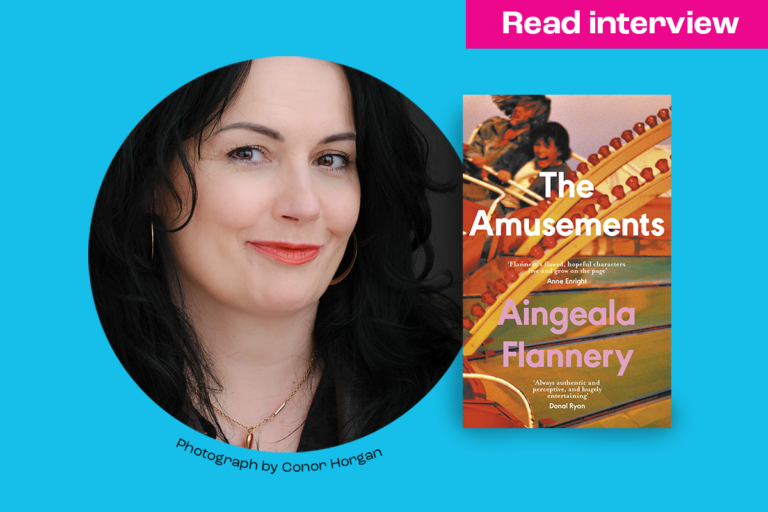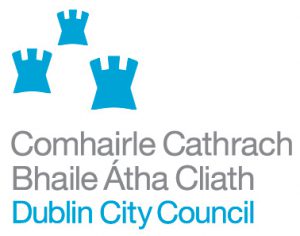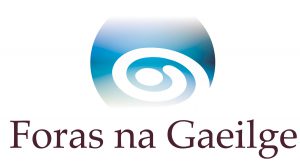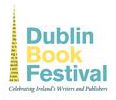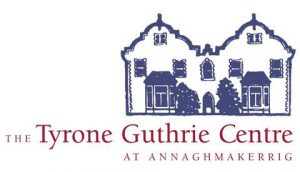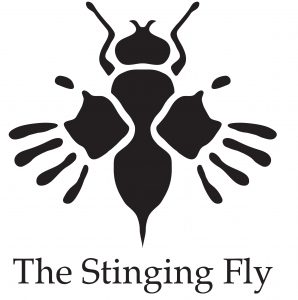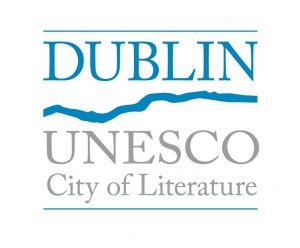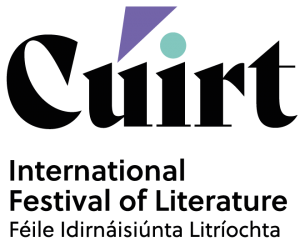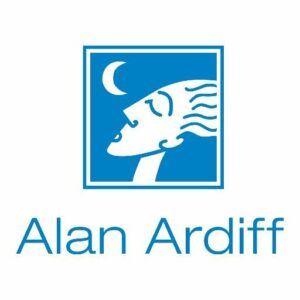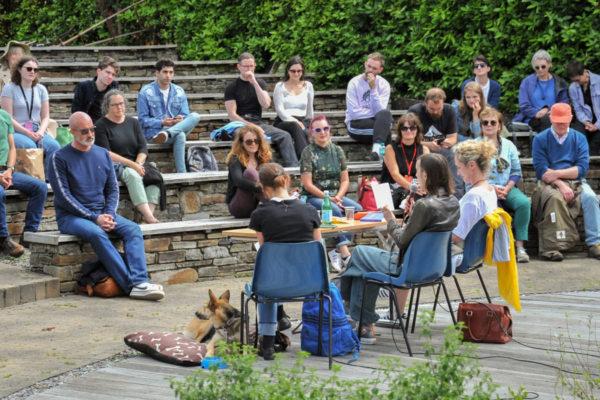
26 July, 2023
Our Young Writer Delegates look back on West Cork Literary Festival 2023
Earlier this month, writers, readers and book-lovers from far and wide travelled to Bantry for the West Cork Literary Festival 2023. From the 7th to the 14th of July, attendees were treated to a week full of readings, conversations, events and special guests, which showcased new voices and a wide range of writing.
Among the attendees were our IWC/West Cork Literary Festival Young Writer Delegates, Rehan Ali, Maitiú Charleton, Thomas O’Donovan and Ashlin O’Sullivan. Each year, the delegates attend events of their choice and write a review of their experience; here are the reviews our delegates wrote up for West Cork Literary Festival!
Soula Emmanuel & Ann-Marie MacDonald
reviewed by Maitiú Charleton
As a Young Writer Delegate I had the opportunity to attend a wide range of captivating literary events throughout the West Cork Literary Festival. One stood out to me, a young queer writer, where two talented LGBTQ+ authors, Ann-Marie MacDonald and Soula Emmanuel, engaged in an honest, sincere and thought-provoking conversation about their latest novels with each other and with host, Sasha de Buyl, a writer and literary programmer, in Bantry Library on the Friday of the festival. The discussion centred around themes of queer isolation, transience, and the power of storytelling to convey universal human experiences.
Soula Emmanuel began by introducing her debut novel, ‘Wild Geese’, which she described as an anti-memoir set in Copenhagen. We heard how the novel delves into the complex and delicate balance between escapism and avoidance. Emmanuel pondered the subjectivities of narrative in trans-centred literature, emphasising the different ways that everyone, cis and trans, goes on their own journey of transition and encounters the challenges faced in fully embracing one’s self. Emmanuel’s extract had the audience laughing and clapping at the incisive sentences and social observations in the text.
On the other hand, Ann-Marie MacDonald shared insights into her latest work, ‘Fayne’, which she has spoken of as her ‘queerest work to date.’ Set in the late 19th century, this novel subverts the conventions of the gothic genre. MacDonald hinted at the complexities of the protagonist’s journey, the struggles faced by a character who, at the time, couldn’t openly express her identity. The audience eagerly anticipated glimpses into this highly anticipated novel, and when MacDonald finished the extract she read the audience gave a collective groan of disappointment.
Although both authors explored themes of queer isolation and subjectivity, they expressed a common aspiration for their work to transcend specific identities and resonate on a universal level. Their novels, while rooted in unique experiences, seek to touch the hearts of readers from diverse backgrounds, fostering empathy and understanding for the complexities of the human condition.
During the event, Ann-Marie MacDonald also shared how her background in theatre influenced her approach to writing. With a keen awareness of the reader experience, she emphasised the importance of maintaining a connection between the narrative and the audience, ensuring that her storytelling remains vivid, engaging, and accessible.
When asked by De Buyl, Soula Emmanuel offered a glimpse into her upcoming novel project, which expands beyond the boundaries of a single culture. This intercultural exploration includes sections set in Crete, Greece, promising a rich tapestry of diverse experiences and perspectives. Emmanuel’s ability to weave together different cultural threads within her narrative was met with enthusiastic anticipation.
In a time where diverse voices are finding greater representation in literature, Ann-Marie MacDonald and Soula Emmanuel stand as powerful examples, using their words to build bridges of empathy, understanding, and celebration of the human spirit. While a lot of queer literature contends with the adversity that marginalised people, and people in general must go through in life, the event was a reminder of the optimistic and transformative power of storytelling.
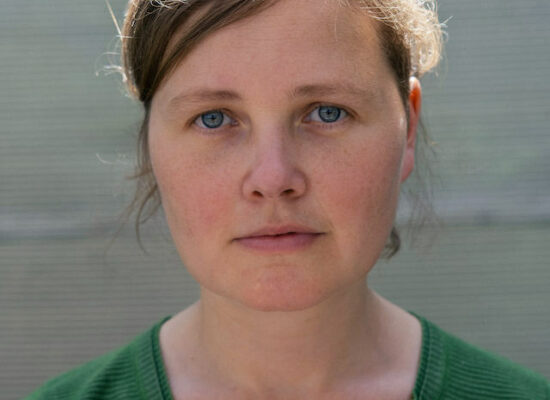
Gerda Blees: We Are Light
Reviewed by Ashlin O’Sullivan
Bantry House tearooms played host to Gerda Blees on Wednesday morning, in an event sponsored by the Dutch Foundation for Literature as part of the New Dutch Writing programme. Blees’ first novel We Are Light was published in English this year but is already a prize-winner in the original Dutch. It follows the Sound & Love commune, a group with an aspiration to live on light and air in pursuit of spiritual enlightenment, chronicling the events that take place after the death of one of their members.
Much of the event focused on a discussion of Blees’ craft – a practice she refers to as “extended writing” – and how this led her to create the novel’s unusual narrative structure. It is told from 25 perspectives, none of them being the main characters. Instead, concepts and objects tell the reader their views on the events, with narrators including cognitive dissonance, dementia, and the scent of oranges. No matter the speaker, the type of voice stays the same – the whole novel makes use of the first-person plural. Blees outlined how this narrative device allowed her to explore group dynamics, family structure, and the relationships of the in-group with the outside world.
I found the speaker and event fascinating. Blees was frank and engaging as she spoke about her creative process and the experience of having your work translated into a language you also speak. One element that stood out to me was her mathematical and precise approach to structure. We Are Light consists of 25 chapters, each exactly 2500 words long. Her new novel, she told us, is being written on paper scrolls, one per chapter, each scroll longer than the last by the golden ratio.
The event ended with a book signing. Copies of the book were available to buy in advance of its English publication date later this summer and came with a green “I read Dutch books” tote bag. It was a perfect way to spend a morning at the West Cork Literary Festival.
Running Feet, Sharp Noses with Sara Baume & Jessica Traynor
Reviewed by Rehan Ali
The final day of the festival brought the young delegates to the charming outdoor amphitheatre of Bantry’s National Learning Network. The sun had come out, its rays bathing the space in light and creating captivating shadows. From those shadows emerge perked ears and wagging tails as at this event not only are people invited but also their furry companions.
‘Running feet, sharp noses’ is a collection of essays on the animal world. Composed of insights from some of the finest writers of today, this anthology acts as an acknowledgement of the undeniable impact of animals on our daily lives.
Treated by readings from contributors Sara Baume and Jessica Traynor, it felt as if we were being invited into a deeply personal space where unique relationships were being explored. This was particularly fascinating to me as someone who has never had a pet of any kind. I had always wondered what these relationships would be like. And now I find myself being granted a window into such relationships in this amphitheatre that seems like an organic extension of its surroundings, blending harmoniously with the verdant beauty of the outdoors.
It is not uncommon for someone to express motherly instincts and affectionate behaviours towards their pets even if they do not want to have children. Sara expresses this sentiment by stating that she is ‘very, very motherly’ when it comes to her dogs. Her essay is in fact about a large rook that she jokingly names ‘Dave’ after her late father but her love for dogs can be seen in her adoring demeanour towards Stevie, her dog that sits at her feet. She begins to share an interesting perspective here reflecting on the differences between raising dogs and raising children. As someone who has done neither it was fascinating to think about how, within the natural order of things, parents never get to see their children get old. In contrast, with dogs, you get to experience entire lifetimes over and over again.
Jessica, who admits to being primarily a ‘cat person’, reminisces about her childhood and the impact that her neighbour’s dog Precious had on her.
Although not hers, it felt to her that Precious was her own. After the breaking up of her parents, in her early teenage years, Jessica would move away bidding farewell to Precious. But many years later, fate would bring them face to face once more. I would have imagined that this would be a happy encounter but as Jessica expressed it was more melancholic than anything else as Precious was not the way Jessica had left her. She had changed. She had aged.
It was interesting to hear Jessica wonder whether this sorrow she felt looking at the aged Precious was in fact “displaced sadness of her parents’ divorce”. As if Precious was emblematic of Jessica’s childhood and her inevitable decline was a rendition of Jessica’s trials and tribulations that she faced in her childhood years.
I was curious to see how affected I would be by this event as someone who has never really had a profound relationship with an animal. To be honest, at the start of the event, sitting in this amphitheatre, surrounded by dog owners and their remarkably tranquil dogs, I felt a bit like an impostor. But as the event developed I realised the philosophy behind these personal relationships extends to greater meaning. Ultimately, I saw it as a philosophy that encourages individuals to reflect on their lives, their place in the world, and their interconnectedness with others and the world, including the animals that exist within it.
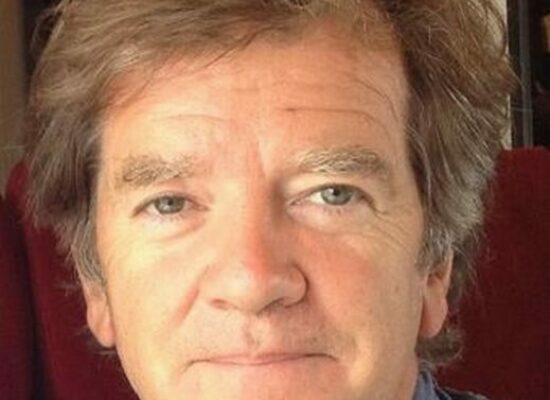
Richard Kearney in Conversation
Reviewed by Thomas O’Donovan
It was Richard Kearney who kicked off the first in-person event at the West Cork Literary Festival, discussing his latest novel, Salvage, and it quickly became apparent to me that the event couldn’t have been hosted in a more fitting venue. The Marino Church, caught between dreeping branches of beech and sprawling townland, served as a perfect backdrop to Kearney’s tale in which the protagonist Maeve O’Sullivan, a young woman living on a remote island off the south coast of Ireland, attempts to reconcile her past with her future in a dynamic equilibrium.
Kearney began by dissecting the dual nature of the titular Salvage. On one hand, it refers to the islanders’ custom of recovering materials from the sunken warships nearby and on the other, the process of preserving the past. In many ways, Kearney’s writing of this book was an act of preservation. During the ten-year research process, Kearney consulted locals of Oileán Bhríd to gain insight into their island and particularly, their language. As such, the passages he read aloud were replete with local Irish names for flora and fauna. Kearney discussed the richness of Irish place names, relaying how there is often a story coupled with each place name. In particular, he told us of the Soldier’s Field, a place where a British soldier once came looking for rent only to find an early grave.
Kearney considered the possible link between the loss of paganism and a loss of appreciation for the Irish landscape. Before the Great Famine, Kearney suggested that the religion of Ireland consisted of an amalgamation of paganism and Christianity. Kearney described these pre-Famine beliefs as pantheistic, in that natural world was seen as a manifestation of God. Kearney summed this belief up succinctly in the words of a dying relative who said, “God is in dogs and dolphins.” Such a belief system, which placed an emphasis on the existence of God in the natural world, served as a bulwark against any serious neglect or destruction of the landscape. However, following the Great Famine, the Catholic Church began to clamp down on such convictions and the landscape suffered. This disconnect persists to this day with the growing climate emergency as we have deceived ourselves into believing that “We host the Earth,” when in reality, “The Earth hosts us,” as Kearney put it.
The passages Kearney read throughout the event were suffused with such cinematic imagery that one audience member asked if Kearney would ever like to see Salvage turned into a film. From the colloquial talk of farmers, “Patience and endurance will take a snail to Jerusalem,” to the language of “oarlocks,” and “gunnels,” “guineas,” and “full scores”, Kearney’s work reeked of authenticity (along with the “rancid cream,” and “rotten herrings,” he described of course).
As I left the church, I found myself asking a simple question: how am I going to salvage my own past and heave it into the future? The famous line from Jaws echoed in response, “You’re going to need a bigger boat.”
Find out more about the West Cork Literary Festival 2023 programme here .



